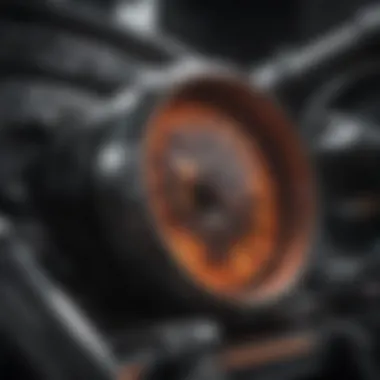Effective Strategies to Prevent Car Overheating


Intro
Preventing car overheating is crucial for ensuring both the performance and longevity of your vehicle. An engine running at excessive temperatures can lead to a myriad of problems, including premature wear, decreased efficiency, and even complete engine failure. Awareness of the underlying causes of overheating, alongside proactive measures, equips both car enthusiasts and everyday drivers with the knowledge necessary for effective vehicle management. This article will delve into various strategies that can mitigate overheating problems, emphasizing the importance of routine checks and informed ownership.
Overheating can stem from factors such as coolant leaks, thermostat failures, and inadequate airflow. Additionally, modern advancements in automotive technology present both challenges and opportunities for car owners. Understanding these dynamics fosters a deeper comprehension of how to maintain optimal engine temperature during operation. The following sections aim to provide a thorough analysis of practical solutions and insightful information to prevent overheating, ultimately enhancing vehicle performance and reliability.
Understanding Overheating
Car overheating often leads to serious engine problems. Understanding this issue is critical for car owners. An overheated engine can suffer from warped components, damaged gaskets, or even total failure. Therefore, recognizing the warning signs and knowing preventive strategies are vital for maintaining vehicle health.
Causes of Car Overheating
Various factors contribute to car overheating. Coolant leaks are often the main culprit. If the cooling system loses its fluid, the engine lacks necessary temperature regulation. Another reason can be a faulty thermostat. If it fails to open or close properly, the flow of coolant is disrupted.
The radiator plays a significant role as well. If it is clogged or damaged, it cannot dissipate heat effectively. Engine water pump malfunction can also lead to overheating. If the pump is not circulating coolant, the engine temperature can rise quickly. Besides mechanical issues, driving habits impact overheating too. Heavy loads and stop-and-go traffic force engines to work harder, resulting in higher temperatures.
Signs Your Car is Overheating
Recognizing signs of overheating is crucial. First, watch for a temperature gauge reading higher than normal. A sudden spike indicates trouble. You may also notice the check engine light turning on, which warrants immediate attention. Another red flag is steam rising from the engine compartment. This occurs when the engine coolant reaches boiling point.
Be aware of unusual sounds as well. If the engine starts to make loud or strange noises, it could mean parts are expanding due to heat. Additionally, pay attention to a burning smell. It might indicate oil or coolant is leaking onto hot engine parts. If any of these symptoms appear, it is essential to act quickly.
The Consequences of Overheating
The consequences of ignoring engine overheating can be severe. Continuing to drive an overheated vehicle may lead to catastrophic engine failure. This can mean costly repairs or even complete engine replacement.
Moreover, overheating can damage the cylinder head. A warped cylinder head can cause oil leaks and decrease engine performance. In some cases, it may lead to head gasket failure. This allows coolant to mix with engine oil, severely affecting lubrication and causing internal damage.
Delaying repair can make the situation worse and escalate costs. A minor issue can become a significant problem and necessitate extensive repairs. Maintaining awareness of your vehicle’s health is critical. Regular checks can prevent an overheating situation, which saves time and money in the long run.
To prevent overheating, understand your car’s cooling system and monitor it regularly.
Preventive Maintenance Techniques
Preventive maintenance is vital to ensuring that your car operates smoothly and efficiently. This approach not only minimizes the chances of overheating but also extends the lifespan of the vehicle’s engine. By implementing routine checks and being proactive, car owners can avoid costly repairs and ensure optimal performance. Preventive maintenance techniques involve understanding how different systems work together and regularly monitoring these systems to catch issues before they escalate.
Regular Coolant Checks
Coolant plays a significant role in regulating engine temperature. Over time, coolant may become contaminated or deplete, leading to insufficient cooling performance. Checking the coolant level should be part of regular maintenance. It's essential to ensure that the coolant reservoir remains filled to the manufacturer’s recommended level. Ultrasonic leak detectors can identify small leaks that are not immediately visible. Additionally, ensuring that the coolant is of appropriate quality is crucial. Overheating can occur if the coolant has not been replaced as per the service intervals.
Inspection of Radiator and Hoses
The radiator is a critical component of your car’s cooling system. It dissipates heat from the coolant and helps maintain engine temperature. Inspecting the radiator for debris and ensuring it is clean is essential. Blockages can cause overheating. Additionally, inspect the hoses for any signs of wear, cracking, or leakage. Hoses that are in poor condition can rupture under pressure, leading to sudden coolant loss. Regularly replacing old hoses is wise to prevent engine damage.
Understanding the Role of Thermostats
The thermostat regulates coolant flow between the engine and the radiator. It opens and closes to maintain optimal engine temperature. A malfunctioning thermostat can lead to either overheating or inadequate heating. Regular checks can ensure that the thermostat operates effectively. Knowing the symptoms of a faulty thermostat, such as erratic temperature readings or engine overheating during operation, can help address these issues early on.


The Importance of Oil Changes
Oil lubricates the moving parts of your engine, reducing friction and heat. Old or contaminated oil can lose its properties, causing engine components to work harder and generate more heat. Routine oil changes are necessary to ensure the engine runs smoothly. Follow the manufacturer guidelines for oil change intervals, usually every 5,000 to 7,500 miles. Use high-quality oil suited for your specific vehicle, as it can drastically influence temperature regulation. As the oil age increases, its ability to dissipate heat declines, increasing the risk of overheating.
Advanced Vehicle Cooling Technologies
The advancement of vehicle cooling technologies plays a crucial role in preventing engine overheating. These systems ensure optimal temperature balance within the engine, leading to improved performance and longevity. As vehicles become more advanced, the integration of cutting-edge cooling technologies is essential. By understanding and implementing these innovations, drivers can significantly reduce the risk of overheating and maintain their vehicles in top condition.
The Functionality of Electric Water Pumps
Electric water pumps have revolutionized the way cooling systems operate in modern vehicles. Unlike traditional mechanical pumps that rely on engine speed, electric pumps provide a consistent flow of coolant, independent of the engine's RPM. This results in several benefits:
- Improved Efficiency: They operate only when necessary, helping to reduce energy consumption and enhance overall fuel efficiency.
- Consistent Cooling: By maintaining a steady flow of coolant, electric pumps ensure that the engine operates within the ideal temperature range regardless of driving conditions.
- Quieter Operation: Electric pumps often operate more quietly than their mechanical counterparts, contributing to a more pleasant driving experience.
The use of electric water pumps is becoming increasingly prevalent, particularly in hybrid and electric vehicles. They provide an effective upgrade for conventional vehicles, ensuring better temperature management.
Innovations in Radiator Design
Innovative radiator designs have emerged to optimize heat dissipation from the engine. Modern radiators incorporate various features to enhance their performance:
- Multi-Layered Structures: Many new radiators use multiple layers of materials to improve heat exchange rates. This allows the coolant to absorb heat more efficiently, preventing overheating.
- Lightweight Materials: Advanced materials, such as aluminum and composites, reduce the overall weight of the radiator without compromising its strength.
- Improved Airflow: Some radiators feature designs that enhance airflow, making it easier for heat to escape. This is particularly beneficial in high-performance vehicles where temperature management is critical.
These innovations not only contribute to effective cooling but also support better overall engine performance, making them a key component in modern vehicle engineering.
Using Engine Fans Effectively
Engine fans are vital in regulating engine temperatures, particularly at low speeds or when idling. Understanding their effective use can make a substantial difference in preventing overheating:
- Variable Speed Fans: Some vehicles are equipped with variable speed fans, which operate at different speeds depending on the engine temperature. This allows for better cooling when it is needed most.
- Thermostatic Control: Fans that are controlled by thermostats will activate when the engine reaches a certain temperature, ensuring timely cooling.
- Regular Maintenance: It is essential to check the functionality of the engine fan. A malfunctioning fan can lead to insufficient airflow, resulting in higher engine temperatures.
In summary, leveraging advanced vehicle cooling technologies can dramatically reduce the likelihood of engine overheating. By understanding the functions of electric water pumps, innovations in radiator design, and the effective use of engine fans, car owners can take proactive steps to ensure their vehicle operates effectively and efficiently.
Driving Habits That Influence Engine Temperature
Driving habits significantly affect a vehicle's engine temperature. An understanding of these habits allows drivers to adopt practices that can prevent overheating. Simple modifications to one's driving style can help in managing engine heat effectively. Therefore, emphasis should be placed on recognizing behaviors that may cause excessive strain on the engine.
Recognizing Overexertion in Engine
Overexertion in an engine often occurs when it is subjected to extreme demands. Situations like rapid acceleration and heavy load can increase the engine's workload, leading to higher temperatures. It is essential to recognize when the engine is stressed.
One clear sign is the increase in the engine's RPMs beyond normal levels. Drivers should monitor the engine's sound and performance. If unusual noises accompany the heavy strain, it could indicate the engine is working too hard. Constantly pushing the engine to its limits not only raises temperatures but may also shorten its lifespan.
Avoiding Stop-and-Go Traffic
Stop-and-go traffic is detrimental to engine health. Frequent stopping and accelerating put additional pressure on the engine, leading to increased heat generation. In such scenarios, the engine runs less efficiently, resulting in overheating risks.
A suggestion for drivers is to avoid peak traffic periods. This can be achieved by adjusting travel times or using alternative routes. Maintaining a steady speed reduces the frequency of stops, helping to regulate engine temperature. Drivers can also consider ways to minimize travel distances, which can play a role in reducing time spent in stop-and-go conditions.


Managing Load on the Vehicle
The load placed on a vehicle directly correlates to its engine performance and temperature. Overloading a vehicle can lead to excessive engine strain, causing a rise in temperature. Each vehicle has a specified load capacity, and exceeding this can lead to severe consequences.
Drivers should regularly assess the weight they are carrying. This includes passengers, luggage, and other cargo. Reducing unnecessary weight can alleviate the pressure on the engine.
Important Note: Keeping the load within recommended limits is crucial for preventing overheating.
Seasonal Considerations
Understanding how seasonal changes affect your car's temperature is crucial for prevention of overheating. Different weather conditions place varying demands on your vehicle's cooling system. Both summer heat and winter cold have specific impacts on engine performance and efficiency. It is essential to adapt your vehicle maintenance and driving practices to account for these shifts.
Preparing for Summer Heat
Summer months bring elevated temperatures, which can significantly strain a vehicle's cooling system. Here are key steps to prepare your car:
- Check Coolant Levels: Make sure that the coolant reservoir is full. High temperatures increase the risk of overheating, so adequate coolant is vital.
- Inspect the Radiator: Ensure that the radiator is clean and free of obstructions. Dirt and debris can limit airflow, reducing the radiator’s efficiency.
- Monitor Tire Pressure: Heat can cause tire pressure to rise. Ensure your tires are properly inflated to prevent blowouts or additional strain on the engine.
- Test the Thermostat: A malfunctioning thermostat can lead to improper heating and cooling of the engine. Consider replacing it before summer hits.
- Use Sunshades: When parked, using sunshades can keep the interior cooler and reduce the need for heavy air conditioning, which in turn can lessen the load on the engine.
Winter and Cooling System Efficiency
In winter, the need to prevent overheating may not seem urgent, but cool weather also affects the cooling system. Here are some considerations for winter:
- Coolant Mixture: Ensure the coolant is mixed properly for the winter season. A blend of antifreeze prevents freezing and maintains optimal performance.
- Inspect Hoses and Belts: Cold temperatures can cause rubber hoses to become brittle. Regular checks help avoid leaks that can lead to overheating.
- Warm-up Your Vehicle: Allow the engine to warm up before driving. This helps the engine reach optimal operating temperatures and minimizes undue stress.
- Avoid Heavy Loads: In winter, driving with heavy loads increases strain on the engine. Be mindful of what you carry in your vehicle.
- Check for Ice or Snow Blockages: Ensure the radiator is clear of ice or snow. Blockages can hinder airflow and the cooling system's performance.
Proper seasonal maintenance is key to preventing overheating regardless of the weather.
With the knowledge of how each season affects vehicle performance, car owners can take proactive steps to ensure their vehicle remains in good condition and operates efficiently. This will not only help in preventing overheating but also extend the lifespan of the vehicle.
When to Seek Professional Help
Recognizing when to seek professional help is crucial for maintaining your vehicle’s health. Ignoring signs of overheating can lead to severe engine damage or complete failure. This section outlines the importance of timely intervention, the signs indicating serious overheating issues, and how to choose the right mechanic for your car's specific needs.
Identifying Serious Overheating Issues
Identifying serious overheating issues is often the first step in determining whether to consult a professional. Symptoms such as the temperature gauge peaking into the red zone or steam rising from the hood can signal that intervention is needed. Other signs include:
- Distorted engine noises: A knocking or pinging sound could indicate severe issues due to excessive heat.
- Fluid leaks: If coolant or oil leaks are evident underneath the vehicle, it could affect engine temperature regulation.
- Indicator lights: Warning lights on your dashboard, particularly the engine temperature light, should never be ignored.
If these symptoms present, it is essential to act promptly. A trained mechanic can diagnose the underlying issues effectively. Delaying maintenance or repairs can escalate a minor problem into a far more costly and damaging one.
Choosing the Right Mechanic
Selecting a competent mechanic is vital for effective car maintenance. Not all mechanics are equipped with the skills or tools required to handle overheating issues specifically. Consider the following when choosing:
- Certifications and Experience: Check for certifications such as ASE (Automotive Service Excellence). Experienced mechanics will be more knowledgeable about common overheating problems.
- Customer Reviews: Seek recommendations from other vehicle owners or online platforms. Detailed reviews can often yield insights into a mechanic’s reliability and capability.
- Communication: A good mechanic should be clear in explaining the issues and proposed solutions. They should also be willing to answer your questions.
In closing, understanding when to seek professional help can significantly impact the longevity and performance of your vehicle. By recognizing serious overheating issues and taking the time to select the right professional, you can mitigate risks and ensure your vehicle operates smoothly.


"A proactive approach to vehicle maintenance can prevent small issues from turning into major expenses."
Staying informed and vigilant will pay dividends in your overall car ownership experience.
Maintaining Knowledge Over Time
Maintaining Knowledge Over Time is critical in the realm of automotive care, especially when focusing on preventing car overheating. The landscape of automotive technology constantly evolves. New innovations and findings are continually being presented. Staying informed is essential for both enthusiasts and everyday car owners. A well-informed owner can make informed decisions about their vehicle’s maintenance and care.
One major aspect of keeping abreast of automotive knowledge is the understanding of how vehicle systems function. For instance, advancements in cooling technologies, such as electric water pumps and advanced radiator designs, can significantly impact how effectively a car maintains optimal engine temperature. Awareness of these innovations helps in making educated choices about vehicle upgrades or repairs.
In addition to technological advances, understanding the best practices for routine maintenance is equally important. This might include knowing when to replace coolant, inspecting hoses, and understanding the signs of potential overheating. Regularly checking for leaks or blockages in the radiator can prevent larger issues down the line. Building knowledge over time enables a proactive approach to vehicle care and enhancement of driving experiences.
Staying Informed on Automotive Advances
To stay informed on automotive advances, owners can leverage multiple resources. Subscribing to car maintenance magazines or following automotive news websites provides updated information. Online platforms such as Reddit, specifically in automotive-related subreddits, can also offer community-driven insights.
Moreover, manufacturers' newsletters and updates provide direct information regarding recalls or technological improvements. Engaging with these sources can yield valuable knowledge that directly impacts car performance and longevity.
Engaging with Automotive Communities
Engaging with automotive communities is another key aspect of maintaining knowledge over time. These communities often serve as hubs for knowledge exchange. Platforms like Facebook host groups that facilitate discussions around specific vehicles or automotive issues.
Participating in forums enables car owners to share experiences and solutions. This interaction can lead to learning from others’ mistakes or successes. Such communal knowledge can sometimes offer real-world practical advice that surpasses conventional maintenance guides.
Building a connection with fellow enthusiasts can deeply enrich one’s understanding of automotive care. It can foster a culture of learning and support.
By keeping abreast of advancements in automotive technology and actively engaging within communities, car owners can better equip themselves to prevent overheating. Such knowledge ensures that they can maximize their vehicle's performance and longevity.
Final Thoughts on Preventing Overheating
Preventing car overheating is not just a matter of comfort, but it significantly impacts the longevity and performance of a vehicle. In the preceding sections, various strategies have been outlined to ensure your engine remains at an optimal temperature. These strategies are not merely recommendations but essential actions for every vehicle owner.
A comprehensive approach involves routine maintenance checks, understanding the car's cooling systems, and adjusting driving habits. When you adopt these preventive measures, you not only save money on potential repairs but also enhance your vehicle's efficiency.
Investing time in understanding your car’s systems provides substantial long-term benefits. For instance, routine coolant checks can prevent overheating before it causes severe issues. Furthermore, knowledge about advanced vehicle cooling technologies empowers drivers to make informed choices about their cars.
A proactive approach toward vehicle maintenance leads to minimal downtime and maximizes efficiency.
Summarizing Key Preventive Measures
Here are the key practices to remember:
- Regular Coolant Checks: Ensure the coolant levels are sufficient and the fluid is clean.
- Inspection of Radiator and Hoses: Look for leaks or wear, as any damage here can lead to overheating.
- Understanding Thermostats: Know how your thermostat operates and when it might need replacement.
- Frequent Oil Changes: Old oil can cause engine friction and overheating, so change the oil as recommended.
Incorporating these habits into your regular car care routine is essential.
The Value of Proactive Caring for Your Vehicle
Caring for your vehicle proactively translates to better performance and reliability. This proactive mindset leads to:
- Extended Engine Life: Cars that are well-maintained usually have a longer operational life.
- Increased Resale Value: A car with a detailed maintenance history is more appealing to potential buyers.
- Enhanced Safety: A well-maintained vehicle reduces the chances of roadside emergencies.
Ultimately, the commitment to maintain your vehicle goes beyond personal convenience; it reflects a responsible approach to ownership. Engaging with automotive communities can provide additional insights and recommendations. Being part of forums and discussions can bring new strategies and tips into your knowledge base.
By equipping yourself with knowledge and performing regular maintenance, you can significantly mitigate the risks associated with car overheating.















